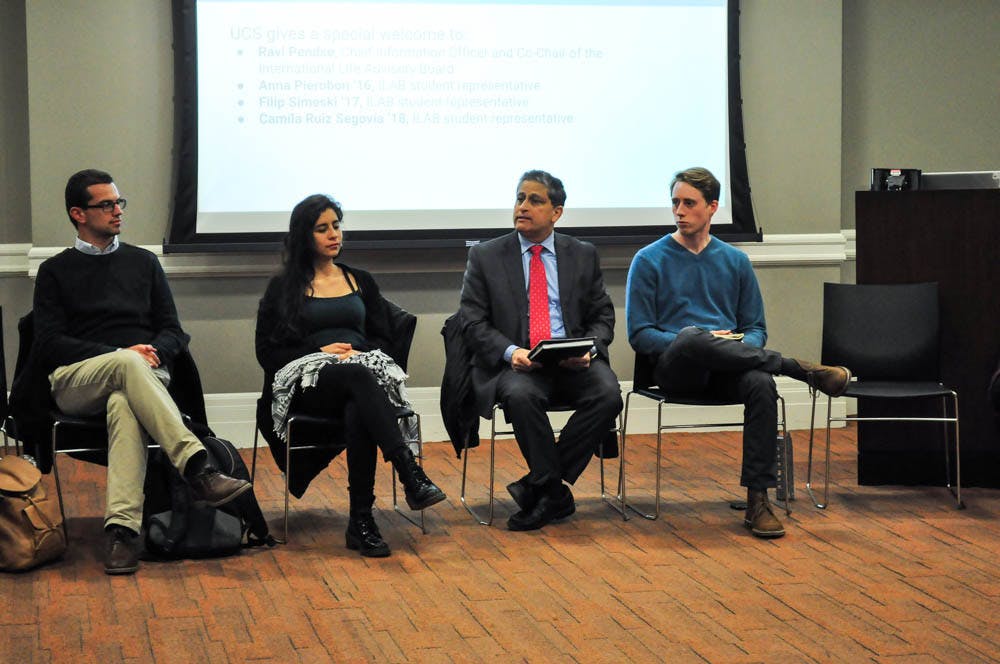Members of the International Life Advisory Board detailed the need for a center for international life on campus and spoke on issues facing international students at the Undergraduate Council of Students general body meeting Wednesday.
ILAB Co-Chair and Vice President for Computing and Information Services Ravi Pendse and student representatives Filip Simeski ’17 and Camila Ruiz Segovia ’18 addressed questions on a range of topics including the student visa application process and the international student orientation program for incoming first-years.
The committee, newly organized this year, is “charged with exploring and addressing the unique needs of international students at Brown,” according to the UCS website. “It’s a great example of a committee that was student-initiated,” said UCS President Sazzy Gourley ’16 at the meeting.
ILAB is in the process of proposing the international life center, which would function much like similar organizations at other universities, such as the University of Chicago, Stanford University and Yale, Simeski said. These centers “have administrative support from their universities,” he said. “They’re social spaces open to everyone, and it’s free to book them.”
"This center would encompass the Office of International Student and Scholar Service, Office of International Programs, English language learning, the associate dean for international students and visitors and potentially the Office of Global Engagement," Simeski wrote in a follow-up email to The Herald. "It will serve as both administrative and social focal point for anyone who feels international or is interested in studying abroad, pursuing (a) career or internship abroad. The space should have a strong welcoming character and openness to both international and domestic students."
At the meeting, Simeski added that Buxton House, advertised as the program housing option for international students, is fundamentally different because it operates as a residential hall under the direction of the Office of Residential Life. “There’s only card access for those who live there,” he said.
“You have to apply (to Buxton) to become a member,” Ruiz Segovia added. “It’s important to have a physical space that is provided by the administration and is open to everyone.”
There is not yet a consensus on where the space would be located, Pendse said. “Everyone’s heart is in the right place, but finding space in the short term is difficult,” he added.
One possibility is the creation of a website that would consolidate the numerous programs for international students in advance of the physical space, Pendse said. The goal is “a one-stop shop where (international students) can find all the help they need,” he said.
The representatives touched on the difficulties created by the timing of International Orientation, a component of the International Mentoring Program: It takes place during other pre-orientation programs and before most domestic students arrive at Brown for the first time. “By the time normal orientation starts, we’ve already formed our friend groups,” Simeski said.
International students who choose to take part in pre-orientation programs like Excellence at Brown and the Third World Transition Program must often prioritize their attendances, missing events for either IMP or their other pre-orientation. “I know people who gave up on Excellence or skipped the IMP social events,” Simeski said.
IMP’s viability throughout the year must also be strengthened, according to the student representatives. After orientation, the program is mostly up to the mentors to coordinate, though mentors do receive University funding, Simeski said. The international life center would theoretically provide mentors with the ability to book space that would otherwise be difficult to find, he added.
“Expanding mentorship throughout the year is an important issue,” Ruiz Segovia said, mentioning the possibility of introducing International Peer Leaders in first-year residence halls along with the currently available Residential Peer Leaders, Women Peer Counselors, and Minority Peer Counselors.
An inevitable issue prevalent in the experiences of all international students is the visa application process. “It’s incredibly stressful for the students, and it varies from country to country,” Pendse said. “You can even be rejected on time of arrival — the visa doesn’t guarantee entry.”
Most of the headaches come courtesy of the State Department, and the University does everything it can to assist international students through the process, Simeski said. “The Office of International Recruitment does a lot of work, but the University doesn’t have a lot of sway” in the visa process, he said.
Correction: An earlier version of this article stated that the International Life Advisory Board representatives would like to create an international students center. In fact, the center would focus on issues of international life and would be open to both domestic and international students.





